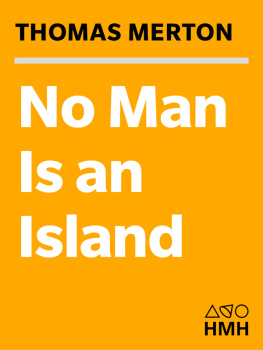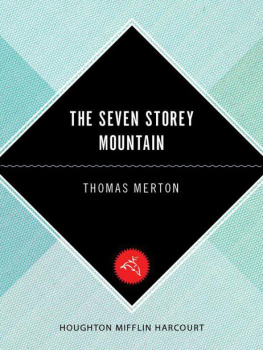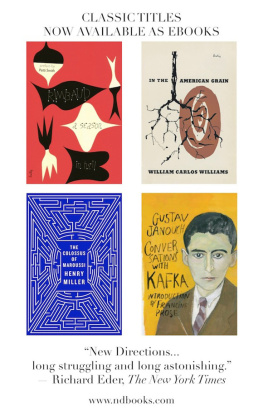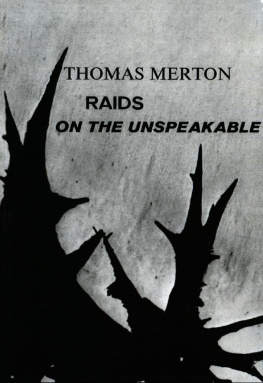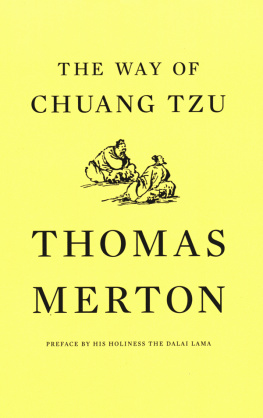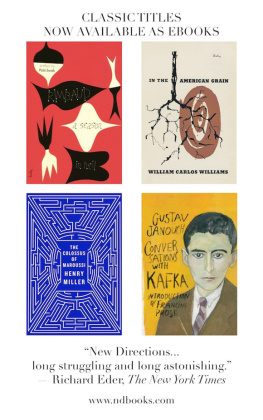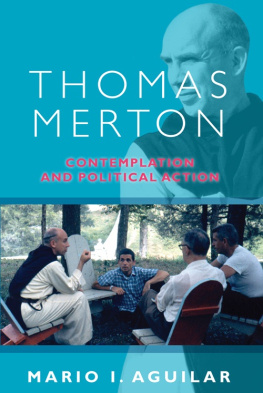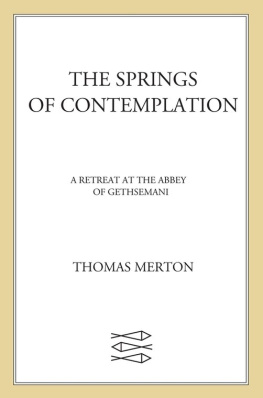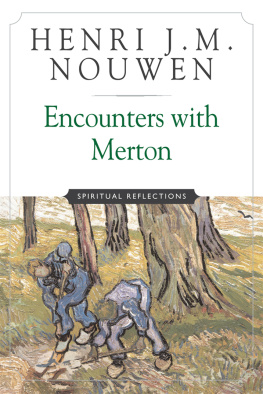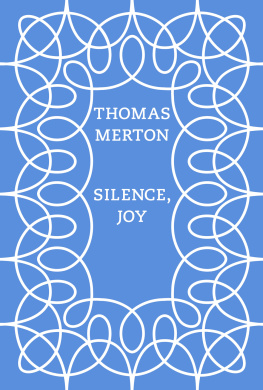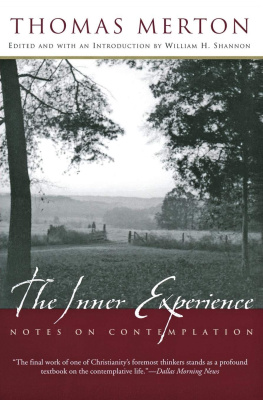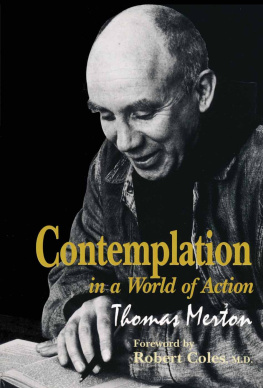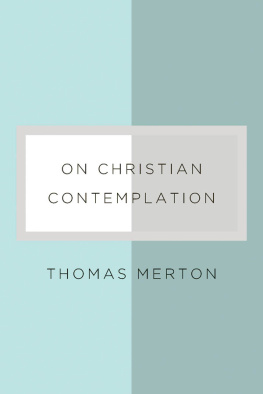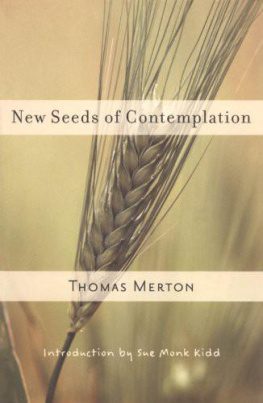Copyright 1955 by The Abbey of Our Lady of Gethsemani
Copyright renewed 1983 by The Trustees of Merton Legacy Trust
All rights reserved. No part of this publication may be reproduced or transmitted in any form or by any means, electronic or mechanical, including photocopy, recording, or any information storage and retrieval system, without permission in writing from the publisher.
For information about permission to reproduce selections from this book, write to Permissions, Houghton Mifflin Harcourt Publishing Company, 215 Park Avenue South, New York, New York 10003.
www.hmhco.com
Ex Parte Ordinis
Nihil Obstat: Fr. M. Thomas Aquinas Porter, O.C.S.O.
Fr. M. Augustine Westland, O.C.S.O.
Imprini Potest: Fr. M. Gabriel Sortais, O.C.S.O., Abbot General
Nihil Obstat: John M. A. Feams, S.T.D., Censor librorum
Imprimatur: Francis Cardinal Spellman, Archbishop of New York
New York, February 28, 1955
The Nihil Obstat and Imprimatur are official declarations that a book or pamphlet is free of doctrinal or moral error. No implication is contained therein that those who have granted the Nihil ObstatImprimatur agree with the contents, opinions or statements expressed.
The Library of Congress has cataloged the print edition as follows:
Merton, Thomas, 19151968.
No man is an island.
I. Spiritual lifeCatholic authors. I. Title.
BX2350.2.M4494 1978 284'.4'82 78-7108
ISBN 0-15-602773-9
eISBN 978-0-547-54285-0
v4.1114
DILECTISSIMIS FRATRIBUS
SCHOLASTICIS ET NEO-SACERDOTIBUS
IN ABBATIA B.V.M. de GETHSEMANI
AUCTOR, QUI ET MAGISTER SPIRITUS,
PERAMANTER
D. D.
Authors Note
Leaving system to others, and renouncing the attempt to lay down universal principles which have been exposed by better men elsewhere, I only desire in this book to share with the reader my own reflections on certain aspects of the spiritual life. I consider that the spiritual life is the life of mans real self, the life of that interior self whose flame is so often allowed to be smothered under the ashes of anxiety and futile concern. The spiritual life is oriented toward God, rather than toward the immediate satisfaction of the material needs of life, but it is not, for all that, a life of unreality or a life of dreams. On the contrary, without a life of the spirit, our whole existence becomes unsubstantial and illusory. The life of the spirit, by integrating us in the real order established by God, puts us in the fullest possible contact with realitynot as we imagine it, but as it really is. It does so by making us aware of our own real selves, and placing them in the presence of God.
This book is, then, a sequel to a previous volume called Seeds of Contemplation. But instead of going on from where that book left off, it goes back to cover some of the ground that was taken for granted before the earlier volume began. This book is intended to be simpler, more fundamental, and more detailed. It treats of some of the basic verities on which the spiritual life depends. It is dedicated to the scholastics studying for the priesthood at the Abbey of Gethsemani, who will perhaps recognize in it some notions they have received in spiritual direction.
Fr. M. Louis, o.c.s.o.
Abbey of Gethsemani
January, 1955
Prologue: No Man Is an Island
No matter how ruined man and his world may seem to be, and no matter how terrible mans despair may become, as long as he continues to be a man his very humanity continues to tell him that life has a meaning. That, indeed, is one reason why man tends to rebel against himself. If he could without effort see what the meaning of life is, and if he could fulfill his ultimate purpose without trouble, he would never question the fact that life is well worth living. Or if he saw at once that life had no purpose and no meaning, the question would never arise. In either case, man would not be capable of finding himself so much of a problem.
Our life, as individual persons and as members of a perplexed and struggling race, provokes us with the evidence that it must have meaning. Part of the meaning still escapes us. Yet our purpose in life is to discover this meaning, and live according to it. We have, therefore, something to live for. The process of living, of growing up, and becoming a person, is precisely the gradually increasing awareness of what that something is. This is a difficult task, for many reasons.
First of all, although men have a common destiny, each individual also has to work out his own personal salvation for himself in fear and trembling. We can help one another to find out the meaning of life, no doubt. But in the last analysis the individual person is responsible for living his own life and for finding himself. If he persists in shifting this responsibility to somebody else, he fails to find out the meaning of his own existence. You cannot tell me who I am, and I cannot tell you who you are. If you do not know your own identity, who is going to identify you? Others can give you a name or a number, but they can never tell you who you really are. That is something you yourself can only discover from within.
That brings us to a second problem. Although in the end we alone are capable of experiencing who we are, we are instinctively gifted in watching how others experience themselves. We learn to live by living together with others, and by living like thema process which has disadvantages as well as blessings.
The greatest of disadvantages is that we are too prone to welcome everybody elses wrong solution to the problems of life. There is a natural laziness that moves us to accept the easiest solutionsthe ones that have common currency among our friends. That is why an optimistic view of life is not necessarily always a virtuous thing. In a time like ours, only the coarse grained still have enough resistance to preserve their fair-weather principles unclouded by anxiety. Such optimism may be comfortable: but is it safe? In a world where every lie has currency, is not anxiety the more real and the more human reaction?
Now anxiety is the mark of spiritual insecurity. It is the fruit of unanswered questions. But questions cannot go unanswered unless they first be asked. And there is a far worse anxiety, a far worse insecurity, which comes from being afraid to ask the right questionsbecause they might turn out to have no answer. One of the moral diseases we communicate to one another in society comes from huddling together in the pale light of an insufficient answer to a question we are afraid to ask.
But there are other diseases also. There is the laziness that pretends to dignify itself by the name of despair, and that teaches us to ignore both the question and the answer. And there is the despair which dresses itself up as science or philosophy and amuses itself with clever answers to clever questionsnone of which have anything to do with the problems of life. Finally there is the worst and most insidious despair, which can mask as mysticism or prophecy, and which intones a prophetic answer to a prophetic question. That, I think, is likely to be a monks professional hazard, so I purify myself of it at the beginning, like Amos who complained, I am not a prophet, nor am I the son of a prophet, but I am a herdsman, plucking wild figs (Amos, 7:14).
The prophetic illusionwhich is quite common in our timeis at the opposite extreme from the gregarious illusion, which is more common still in every time. The false prophet will accept any answer, provided that it is his own, provided it is not the answer of the herd. The sheep mentality, on the other hand, accepts any answer that circulates in its own flock, provided only that it is not the answer of a prophet who has not been dead for at least five hundred years.
Next page
